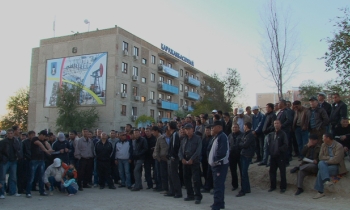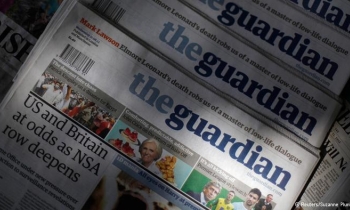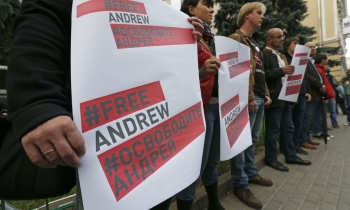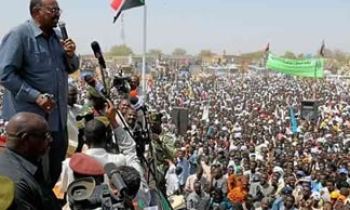Ethiopian authorities are hunting down journalists, civil society activists and opposition leaders in a bid to clamp down on government critics following public protests that left more than 40 dead at the hands of security forces, report the Ethiopian Free Press Journalists' Association (EFJA), the International Press Institute (IPI), Reporters sans Frontières (RSF) and the Committee to Protect Journalists (CPJ).

RSF has appealed to United Nations secretary-general Kofi Annan for "urgent mediation" in Ethiopia, where editors of privately-owned newspapers have been imprisoned, forced underground or charged with treason since an outbreak of rioting and a violent crackdown by the police.
"The Ethiopian government is once again yielding to panic and sending its police to settle its differences with the opposition," a RSF release said. "Appropriate methods exist if Prime Minister Meles Zenawi wants to challenge press reports. And if they do not exist, he is in a position to create them. Instead, he has launched a manhunt, filled his prisons with prisoners of conscience and plunged his country into a terrible political crisis." Ethiopia was ranked 131 in RSF's Worldwide Press Freedom Index 2005
"The Committee to Protect Journalists (CPJ) is outraged by these ongoing arrests," said Ann Cooper, CPJ executive director. "We call on the Ethiopian authorities to abandon any idea of bringing treason charges against journalists, and to end this blatant attempt to shut down the country's independent media."
CPJ says eight journalists have been detained so far: Andualem Ayle of the private, Amharic-language weekly "Ethiop"; Nardos Meaza of the private, Amharic-language weekly "Satanaw"; Zekarias Tesfaye, publisher of the private, Amharic-language weekly "Netsanet"; Dereje Habtewolde, deputy editor of "Netsanet"; Fassil Yenealem, publisher of the Amharic-language weekly "Addis Zena"; Wosonseged Gebrekidan, editor-in-chief of "Addis Zena"; Dawit Kebede, editor-in-chief of "Hadar"; and Feleke Tibebu, deputy editor of "Hadar".
Police have searched the offices of "Netsanet" "Ethiop" and "Abay", and confiscated documents, computers, money, and other equipment and materials. Ethiopian authorities have also used state-owned media to launch a smear campaign against broadcasters Voice of America (VOA) and Germany's Deutsche-Welle.
Information minister Berhan Hailu also called VOA and Deutsche-Welle mouthpieces of the main opposition alliance, the Coalition for Unity and Democracy (CUD), according to a story in the state-owned Ethiopian Herald. Hailu said the stations were "bent on destabilising the peace and stability of the country." Both stations are respected news sources in Ethiopia, which has no local independent radio stations. Local journalists told CPJ that the minister's remarks could endanger the safety of VOA and Deutsche Welle reporters in Ethiopia.
The Ethiopian Herald's article follows two worrying attacks on VOA correspondents, both of whom are Ethiopian citizens. On October 30, uniformed police pulled VOA correspondent Eskinder Firew from a taxi in which he was travelling with several other journalists. The police seized his tape recorder and listened to several minutes' of tape before returning it. A man in civilian dress accompanying the police then threatened to kill Firew if he continued to work for VOA, local sources told CPJ.
The International Press Institute director Johann P Fritz said, "While in a time of crisis the media should do their utmost to report news in a measured and calm manner, government officials should also refrain from making threatening remarks that will only exacerbate the already dangerous situation and perhaps endanger journalists' lives." Ethiopia is currently in the IPS Watch List.
Fritz said, "The arrest and jailing of journalists by the authorities is also a worrying sign that the government is seeking to suppress the media's right to comment on the ongoing civil crisis. The arrests will only encourage self-censorship and, as has already happened, cause other journalists to leave the country in fear of their lives. Just as importantly, those protesting the actions of the government must also respect the rights of the media."

RSF continued : "As long as it does not advocate murder or hatred, Ethiopia's privately-owned press has an absolute right to express its views without having to face extravagant charges. We appeal to the judicial authorities to release the detained journalists at once, announce any charges they may still face and, if necessary, let them defend themselves in a climate of fairness and independence." It said: "Mediation by the office of the UN secretary-general could help to halt Ethiopia's continuing disintegration in which the press is one of the victims."
The Ethiopian government has issued a list of 58 persons wanted for their part in the street violence that has shaken the country since November 1. They include opposition members, civil society leaders and the publishers and editors of Amharic-language weekly newspapers based in Addis Ababa.
The state-owned media followed up with appeals for witnesses and photos of some of those on the list, which was published in the November 6 issue of the Amharic-language biweekly Iftin. Leaders of the main opposition alliance, the Coalition for Unity and Democracy (CUD), human rights activists and NGO representatives are among those named.
Fassil Yenealem, Wosonseged Gebrekidan, Zekarias Tesfaye and Dereje Habtewold went to the police on November 9 and were immediately arrested. Hadar editor Dawit Kedebe and his deputy, Feleke Tibebu, were previously arrested on November 2 and detained in Addis Ababa's main prison. They appeared in court on November 7 with a group of opposition leaders and activists. The court ruled that they should remain in custody but did not formally charge them. The other wanted journalists have gone into hiding.
Prime Minister Meles said on November 9 that the imprisoned opposition members and journalists were charged with treason, which carries the death penalty. "They are accused of launching an uprising," he said, stressing that, while he did not know what the prosecutor would ask for, the death penalty was "still legal" in Ethiopia. He went on to say that he personally opposed the death penalty in these cases, preferring prison sentences. The journalists had been arrested for their "role in the uprising," he added.
Since November 1, the police have cracked down hard on demonstrations organised by the CUD in Addis Ababa and several provincial cities in protest against the results of the May 15 legislative elections, which gave the ruling party two thirds of the seats in parliament. The CUD accuses Meles Zenawi's Ethiopian Peoples Revolutionary Democratic Front (EPRDF) of rigging the vote count. A total of 48 people have been killed by the police and 200 have been injured since the start of the protests. At least 11,000 have been arrested, of whom 4,000 were later released on the grounds that they had no "active" role in the violence.
A number of Amharic-language publications have acted as mouthpieces for the opposition and have published unverified or openly partisan reports, much to the regret and embarrassment of several journalists contacted by RSF. Many newspapers stopped appearing after the outbreak of the violence. But local sources said newspaper vendors resumed work on November 11 and several Amharic-language newspapers whose editors are not in prison were back on sale.









